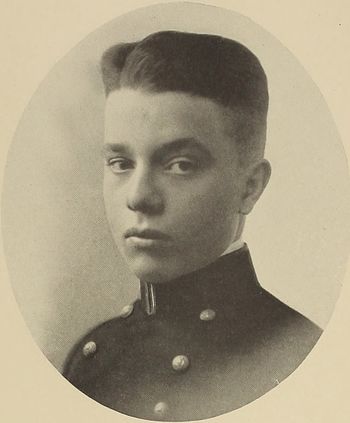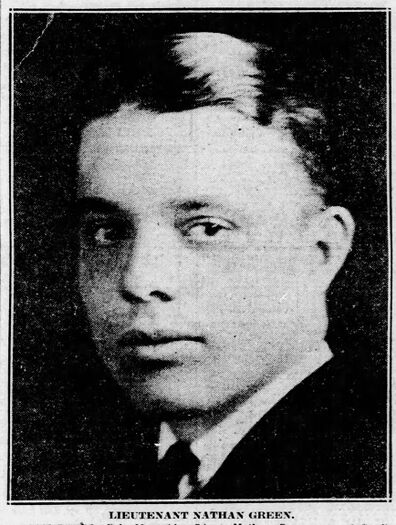NATHAN GREEN, JR., LT, USN
Nathan is currently listed with his classmates in Memorial Hall. However, we have recommended to the Memorial Oversight Committee at the US Naval Academy that he be removed for the reason listed at the bottom of this page; his loss was not due to hostile action or the result of his military duties.
His entry remains below so we do not lose his memory or the knowledge of his life and service.
Nathan Green, Jr. '21
Lucky Bag
From the 1921 Lucky Bag:
Nathan Green, Jr.
Nashville, Tennessee
"Nat" "Gadget"
NAT is one of the most easy-going, non-rhino men in the class, but he never looks or acts the part. Entertaining the idea that dragging was more trouble than it was worth, but at the same time having a weakness for feminine smiles Nat's presence in the stag line was conspicuous. This was rather unfortunate for his line was wicked and the femmes were thereby deprived of great enjoyment.
Hobbies? Oh, yes. Music for instance. Those on the old Maine will probably remember the renditions of "The Garbage Gentlemen's Ball," "The Little Bird," etc., which the Agony Quartette would give nightly. He is rather classical in that line, too. Those on the ground deck were often startled by strains of Puccini and Rimsky—Korsakoff emanating from his room in a mellow boatswain's mate's tenor. His other hobby is boning foreign navies. If you ever want to know the number of stages in the Queen Elizabeth's turbines or the name of the Russian Minister of Marine he can tell you.
His goat does not break loose easily, but accept a tip from us and never mention the state of Tennessee in his presence unless you mean to extol it.
"Say did any of you fellows see a twenty dollar bill lying around?"
Buzzard.
The Class of 1921 was the last of the wartime-accelerated classes. "1921A" was graduated on June 3, 1920; the second half, "1921B", was graduated on June 2, 1921. Nathan was graduated with 1921A.

Nathan Green, Jr.
Nashville, Tennessee
"Nat" "Gadget"
NAT is one of the most easy-going, non-rhino men in the class, but he never looks or acts the part. Entertaining the idea that dragging was more trouble than it was worth, but at the same time having a weakness for feminine smiles Nat's presence in the stag line was conspicuous. This was rather unfortunate for his line was wicked and the femmes were thereby deprived of great enjoyment.
Hobbies? Oh, yes. Music for instance. Those on the old Maine will probably remember the renditions of "The Garbage Gentlemen's Ball," "The Little Bird," etc., which the Agony Quartette would give nightly. He is rather classical in that line, too. Those on the ground deck were often startled by strains of Puccini and Rimsky—Korsakoff emanating from his room in a mellow boatswain's mate's tenor. His other hobby is boning foreign navies. If you ever want to know the number of stages in the Queen Elizabeth's turbines or the name of the Russian Minister of Marine he can tell you.
His goat does not break loose easily, but accept a tip from us and never mention the state of Tennessee in his presence unless you mean to extol it.
"Say did any of you fellows see a twenty dollar bill lying around?"
Buzzard.
The Class of 1921 was the last of the wartime-accelerated classes. "1921A" was graduated on June 3, 1920; the second half, "1921B", was graduated on June 2, 1921. Nathan was graduated with 1921A.
Loss
Nathan was murdered and robbed following a party on November 13, 1925, at Coronado, California. He was the engineering officer aboard USS Moody (DD 277).
Other Information
From researcher Kathy Franz:
Nathan attended Castle Heights Military Academy and graduated at the age of 15 in 1916.
After the Naval Academy, he was assigned to the Pacific fleet on a submarine destroyer. His boat was involved with several destroyers that went on a reef off the Pacific coast.
For one year, he served on the battleship Tennessee and then four years on a destroyer squadron in the Pacific station.
He was promoted to first lieutenant in June.
His father was Chief Justice Grafton Green of the Tennessee State Supreme Court.
Per the Nashville Banner, February 13, 1926:
Secretary Curtis D. Wilbur of the navy department has written a letter to Chief Justice Grafton Green . . . in which he refers to the valuable contribution to the air service by his son. The letter is as follows:
“Department of the Navy, Office of the Secretary, Washington, Feb. 6, 1926 – My dear Mr. Green – Your late son, Lieut. Nathan Green, under date of Oct. 7, 1925, submitted an article on “Possible Tactical Employment of Aircraft Smoke Screens” to the naval institute, suggesting that if its contents were not confidential, it be published in its proceedings. The article has been referred to the naval war college and to the department for decision as to the confidential nature of its contents. Due to the valuable character of the article and its importance to the national defense of our country, it has been decided that it would be unwise to publish it.
“In communicating this decision to you, I desire to express the appreciation of the department for this valuable work of your late son. In commenting on this article, the president of the naval war college states the following:
“The war college comments that this is an excellent article. The grasp and forceful exposition of tactical matters discussed makes all the more deplorable the loss of this officer to the service. His conclusions and observations on the use of aircraft in battle are excellent. Lieut. Green has made a distinct contribution to the subject.’
“Lieutenant Green’s death is a distinct loss to the service and I feel that the high praise and reception which the article he prepared has received must be gratifying to you as it is to me. I regret that its nature prohibits its publication. It will be utilized, however, in connection with our own naval services.
“Very respectfully, Curtis D. Wilbur, Secretary of the Navy.”
Wilbur asked for another civil investigation to be opened into Nathan’s death, and all naval documents be sent to them. Nathan was the originator of secret naval warfare plans, and that may have been a motive for his murder.
Two other Navy men died mysteriously over the next four months. On January 28, 1926, Leslie William Nilsson, engineman on the Moody, left a suicide note and died from drinking poison. His mother said he was happy, wanted to re-enlist, and would never commit suicide. Andrew B. Griffin, aviation machinist’s mate, first class, was found in March floating in the bay with a deep gash on his forehead. No one was apprehended for these three deaths.
He is buried in Tennessee.
(Note though Find A Grave lists him as "III", he was listed in all contemporaneous records as "Jr." His his great-grandfather was Nathan, 1792-1866, and his grandfather was Nathan 1827-1919. Nathan's father was named Grafton.)
Photographs
Career
Nathan was commanding officer of USS Thatcher (DD 162) for just over a month in 1922.
Memorial Hall Error
Murder is not a criteria for inclusion in Memorial Hall.
